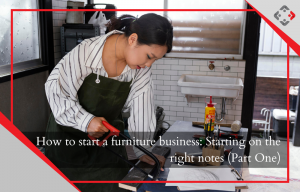How to start a furniture business: Starting on the right notes (Part One) - YourRetailCoach
The dynamics of starting a furniture business have undergone several big changes since eCommerce came into the picture.
PUNE, MAHARASHTRA, INDIA, June 13, 2024 /EINPresswire.com/ -- The ever-increasing adoption of digital tools and technologies has brought about many transformative changes in the furniture value chain. In this communiqué, retail and eCommerce consulting brand, YourRetailCoach (YRC) highlights some of the first things first of starting a furniture business in today’s world.
Get advise for Retail Business Consulting : https://www.yourretailcoach.in/contact/
#𝟏 𝐖𝐡𝐲 𝐅𝐮𝐫𝐧𝐢𝐭𝐮𝐫𝐞 𝐁𝐮𝐬𝐢𝐧𝐞𝐬𝐬?
When picking to start a business, the first question should be - why that particular business? Finding the right answers to this question helps establish the foundational reasons to believe that the conceived entrepreneurial idea will float and turn out to be successful with the right set of efforts. The reasons often contain one or more of these elements:
· Presence of domain knowledge and expertise
· Presence of niche experience in the concerned line of business
· Already a value chain partner
· Niche/gaps identified (unique value)
· Competitive advantage (e.g. family business, own commercial space)
· Early access/applicability of any advanced technology (e.g. 3D furniture printing)
#𝟐 𝐂𝐨𝐧𝐬𝐢𝐝𝐞𝐫𝐚𝐭𝐢𝐨𝐧 𝐨𝐟 𝐈𝐧𝐭𝐞𝐠𝐫𝐚𝐭𝐢𝐨𝐧 𝐒𝐭𝐫𝐚𝐭𝐞𝐠𝐲
One of the first things to consider while contemplating starting a business is to see if there is any existing expertise or leverage in the value chain. For example, a carpentry workshop business already possesses the production capabilities. This makes the entry of such businesses into retailing easier.
#𝟑 𝐇𝐨𝐰 𝐔𝐧𝐢𝐪𝐮𝐞?
Furniture retailing has become a highly competitive space. It is extremely challenging for businesses to survive and grow without sustainable brand distinction. Given that, some of the pertinent questions to be asked at this point are:
· What gaps in the market will be covered?
· How the core offerings will benefit customers?
· Are the intended value propositions unique?
· Can such propositions be easily simulated by competitors in a short to mid-term period?
· How can any pre-existing capability be leveraged to create UVPs and brand distinction?
#𝟒 𝐇𝐨𝐰 𝐏𝐫𝐨𝐟𝐢𝐭𝐚𝐛𝐥𝐞?
In the early stages of tinkering with and improvising a business idea, efforts should be also made to find strong reasons supporting the commercial feasibility of the future enterprise.
For example, if 3D printing is going to be used as production technology, what kind of capital expenditure will be required for setting up the manufacturing facility? Who is going to finance that kind of money? What kind of final prices and margins are we looking at? Can the final pricing compete with business with traditional production capabilities?
These and other such questions and considerations constitute important objectives of market research, furniture business model development, and furniture business planning. Profitability is also affected by many simple decisions. For instance, there are many paid and free furniture inventory management software applications or software for furniture retailers, manufacturers, and suppliers. While paid software applications add to operational expenditure free software solutions could more or less do the same job without upsetting operational budgets.
#𝟓 𝐇𝐨𝐰 𝐆𝐫𝐨𝐰 𝐚𝐧𝐝 𝐄𝐱𝐩𝐚𝐧𝐝?
When thinking of starting a business, a simultaneous focus on future growth and expansion strategies is also important.
Small furniture businesses usually go for market penetration (new customers in the same markets with the same offerings), expansion of floor areas of the existing store(s), and opening new branches to serve new localities.
Starting medium-sized businesses onwards, the tendency is to go for expanding to completely new locations, integration, diversification, and franchising.
Inorganic growth and expansion routes like M&As and JVs are more common with large-scale companies or MNC brands.
Operations planning also plays an instrumental role in setting up the foundation for growth and expansion. Good-quality operations management also helps increase sales in furniture business.
#𝟔 𝐇𝐨𝐰 𝐍𝐨𝐭 𝐅𝐚𝐢𝐥?
Some of the biggest reasons behind sluggish growth or even failure in the furniture business are the absence of niche, misreading market demand and trends, outdated designing skills, fund and liquidity crisis, poor inventory management, operational inefficiencies, poor quality control, and not adopting eCommerce. Businesses must remain highly aware of what keeps them going and what could prevent them from doing so. They must plan and prepare for the risks and threats to their business. For example, by not having a digital presence in a market where demographic trends and consumer behaviour speak otherwise could mean giving away existing or potential market share to competitors via online channels.
𝐀𝐛𝐨𝐮𝐭 𝐘𝐨𝐮𝐫𝐑𝐞𝐭𝐚𝐢𝐥𝐂𝐨𝐚𝐜𝐡:
Your Retail Coach (YRC) is a retail and eCommerce consulting firm with more than 10 years of experience in developing and delivering a wide range of curated business solutions for startups and existing enterprises. With a growing global presence, YRC has served more than 500 clients in 25+ verticals. In furniture business consulting, YRC offers planning and implementation services and solutions for business setup and growth and expansion plans.
Get advise for Retail Business Consulting : https://www.yourretailcoach.in/contact/
Dr Rupal K Shah
Mind-A-Mend Consultancy Private Limited
+91 9860-426-700
consult@mindamend.net
Visit us on social media:
Facebook
X
LinkedIn
YouTube
How to start a furniture business? Furniture Business Plan

